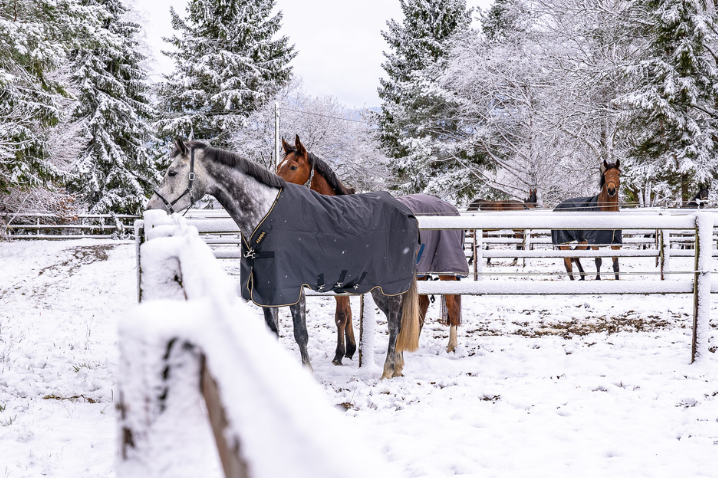Der Winter hat diese Woche mit einem Paukenschlag Einzug gehalten, denn die Temperaturen sind hier in Irland und Deutschland drastisch gesunken. Kalte, winterliche Bedingungen bringen für Pferdebesitzer eine Reihe von Herausforderungen mit sich, von eisigen Temperaturen bis hin zu vereisten Böden. Das Eindecken ist zwar ein wichtiger Bestandteil der Winterpflege, aber ein ganzheitlicher Ansatz für den Umgang mit Pferden bei kaltem Wetter wird dazu beitragen, dass Ihre Pferde trotz des drastischen Temperaturwechsels gesund bleiben und sich wohl fühlen. Hier sind unsere wichtigsten Tipps:
DECKEN 101

Zwar sind Pferde mit ihrem dicken Winterfell von Natur aus gegen die Kälte gewappnet, doch nicht alle Pferde können sich bei einem Temperatursturz ausschließlich auf ihre natürliche Isolierung verlassen. Bei geschorenen Pferden, älteren Pferden oder Pferden mit Schwierigkeiten, ihr Gewicht zu halten, kann es wichtig sein, die richtige Decke zu besorgen, um ihre verminderte Fähigkeit, sich warm zu halten, zu kompensieren. Wenn die Temperaturen über Nacht unter den Gefrierpunkt fallen, kann man mit den Aloga Linern die Wärme der kompatiblen Decken leicht erhöhen, ohne dass sie zu dick werden. Für Pferde, die mehr Zeit im Stall verbringen, bieten die Aloga Pro Stable Deckeneine wärmespeichernde Lösung und sind gleichzeitig atmungsaktiv, damit Ihr Pferd seine Körpertemperatur richtig regulieren kann.
Achten Sie auf Anzeichen, die darauf hindeuten, dass Ihr Pferd friert, z. B. Verhaltensänderungen oder Signale wie
- Frösteln
- Kalte Ohren (am Ohransatz)
- Eingezogener Schweif
- Gekrümmte Haltung
- Körperstellen, die sich kühl anfühlen
Prüfen Sie beim Wechseln der Decke oder beim Hinzufügen von Aloga-Linern immer, ob die Decke richtig sitzt, damit sie nicht reibt oder verrutscht, und beachten Sie unsere Anleitung zum Anpassen. Beobachten Sie sowohl Ihr Pferd als auch die Wetterbedingungen genau, da eine zu dicke Decke zu Überhitzung führen kann. Überprüfen Sie die Temperatur Ihres Pferdes unter der Decke regelmäßig und passen Sie sie dem Wetter an.
UNTERSCHLUPF 
Wenn es möglich ist, kann der Zugang zu einer komfortablen, schützenden Umgebung einen großen Unterschied bei der Versorgung Ihrer Pferde im Winter ausmachen. Der Zugang zu einem Windschutz oder einem Unterstand, der vor Wind, Schnee und Regen schützt, bietet Ihren Pferden Schutz vor rauem Wetter. Kontrollieren Sie die Koppeln regelmäßig auf Eis, gefährliche Gegenstände oder beschädigte Zäune, die bei einem Wetterumschwung ein Risiko darstellen könnten. Wenn Pferde längere Zeit im Stall gehalten werden, kann eine Erhöhung der Einstreutiefe für zusätzliche Wärme und Isolierung gegen kalte Bodenflächen sorgen.
FUTTER & WASSER 
Pferde erzeugen ihre Körperwärme durch Verdauung. Daher ist die richtige Ernährung ein wichtiger Bestandteil des Managements bei kaltem Wetter. Erhöhen Sie das Futter, indem Sie Heu zur freien Auswahl anbieten, oder erhöhen Sie die Rationen während der kalten Jahreszeit. Die Verdauung von Ballaststoffen im Heu ist eine der besten Möglichkeiten für Pferde, sich auf natürliche Weise warm zu halten. Achten Sie darauf, dass die Pferde mit dem täglichen Futter ausreichend Vitamine und Mineralien erhalten, um die allgemeine Gesundheit zu bewahren. Die Zugabe von Ölen wie Carron-Öl zu dieser Jahreszeit kann dazu beitragen, Körpergewicht und Kondition in einer leicht zu fressenden Form zu erhalten. Der Zugang zu frischem, sauberem Trinkwasser ist auch bei sinkenden Temperaturen wichtig. Pferde neigen dazu, weniger zu trinken, wenn das Wasser kalt oder gefroren ist, und dies erhöht das Risiko von Dehydrierung und Koliken. Die Zugabe von etwas wärmerem Wasser zu Eimern oder schwimmenden Gegenständen wie Bällen hilft, das Wasser fließen zu lassen. Die Zugabe von Elektrolyten zum Futter in dieser Zeit kann Ihr Pferd dazu anregen, regelmäßig zu trinken.
AN DER ROUTINE FESTHALTEN 
Pferde gedeihen am besten in einem geregelten Tagesablauf. Auch wenn das Wetter den Weidegang beeinträchtigen könnte, sollten Sie den Rest des Tages so normal wie möglich gestalten. Versuchen Sie, die Pferde täglich zu striegeln, indem Sie die Decken vollständig entfernen, um die Gesundheit des Fells zu überprüfen und die natürlichen Öle zu stimulieren, die den Glanz fördern. Die Hufpflege ist auch in der kalten Jahreszeit ein wichtiges Thema - durch regelmäßiges Auskratzen der Hufe werden Schlamm-, Schnee- oder Eisablagerungen entfernt. Das Einölen der Hufe hilft, die natürliche Feuchtigkeit zu erhalten. Achten Sie auf den allgemeinen Zustand Ihres Pferdes, einschließlich Gewicht, Kondition und Verhalten. Plötzlicher Gewichtsverlust oder Lethargie können auf gesundheitliche Probleme hindeuten.
Für Pferde, die während der Wintersaison noch arbeiten oder an Turnieren teilnehmen, kann das kalte Wetter besondere Überlegungen mit sich bringen. Möglicherweise müssen Sie zusätzliche Zeit für ein gründliches Aufwärmen und Abkühlen einplanen, damit sich die Muskeln vollständig an die Außentemperaturen gewöhnen können. Stellen Sie sicher, dass Ihr Pferd nach dem Training vollständig trocken ist, bevor Sie es wieder eindecken. Die Verwendung einer schnell trocknenden Abschwitzdecke wie dem Aloga Waffle cooler kann die Trocknungszeit verkürzen und den Schweiß aus dem Fell Ihres Pferdes entfernen, so dass es schneller in seine Stall- oder Weidedecke eingedeckt werden kann. Vermeiden Sie nach Möglichkeit das Reiten auf eisigem oder zu hartem Boden, um Verletzungen zu vermeiden.
Da sich die Wetterbedingungen in der Mitte des Winters in Europa weiter ändern, halten Sie sich mit unserer Serie Decken 101 auf dem Laufenden, um zu erfahren, wie Sie Ihre Pferde bei jedem Wetter glücklich und komfortabel halten können.

